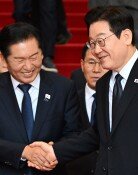How Will Trade Issues between Korea and the U.S. be Affected?
How Will Trade Issues between Korea and the U.S. be Affected?
Posted November. 03, 2004 23:02,
The outcome of the U.S. presidential election is likely to influence pending trade issues between Korea and the U.S., including the liberalization of the rice market and the abolition of the screen-quota system.
Experts analyze that there is a high probability that the U.S. government will earnestly pressure various trade issues as the U.S. trade deficit is enlarging.
Researcher Lee Jun-kyu, the leader of the Americas research team of the Korea Institute for International Economic Policies, forecasted, Within the U.S., the mood that the U.S. can no longer sit back and watch East Asian countries, which show an immense trade surplus with the U.S., is prevalent. It is highly likely that the U.S. government will strongly demand the liberalization of produce markets or the abolition of the screen-quota system.
Nonetheless, the analysis that Bushs reelection is better to Korea regarding its export to the U.S., which accounts for 17.7 percent of its total exports, is prevalent.
While candidate John Kerry of the Democratic Party hinted at aggressive trade policies, pointing out that the liberalization level of the automobile markets of Korea and Japan were not enough, the Republican Party, in comparison, bolsters free trade.
Director Cho Tae-yeol of the Bilateral Trade Bureau of the Office of Trade of the Ministry of Foreign Affairs and Trade predicted, Unlike candidate Kerry, President Bush has been emphasizing the principle of free trade regarding trade negotiation issues and has shown a positive position regarding the alleviation of trade barriers within the U.S. Bushs reelection is likely to have a positive influence regarding Koreas exports to the U.S.
Moreover, it is analyzed that the massive tax reduction policy of the Bush administration will recover consumption psychology in the U.S., and it will lead to increased exports of Korean products to the U.S.
Yet, Bushs reelection is predicted to prolong the phenomenon of high oil prices. In other words, as it is highly like that Bush will continue his aggressive Middle East policies, the resulting political instability will ultimately prolong high oil prices. This is bad news for Korea, which is heavily dependent on Middle East oil.
There are also analyses that the fate of domestic industries will be strikingly different. In its recent report, The Effects of the U.S. Presidential Election and Countermeasures, the Korea Chamber of Commerce and Industry analyzed that while Bushs reelection will be a plus for domestic steel industry and construction orders abroad, it will be a negative for the information technology (IT) field.
As the Republican Party is friendly to traditional industries, Bushs reelection will prolong the upswing of the U.S. steel business, and it will work as a chance for Koreas steel exports to increase in the U.S. On the other hand, in the IT fields, in which the Republicans are less friendly compared with the Democrats, it was forecasted that the current adjustments will continue.
In addition, if oil prices remain high due to President Bushs reelection, orders that domestic construction companies will receive in the Middle East are forecasted to increase.
Jong sik Kong Jae-Seong Hwang kong@donga.com jsonhng@donga.com





![트럼프의 그린란드 병합 의지, ‘이 사람’이 불씨 지폈다[지금, 이 사람]](https://dimg.donga.com/c/138/175/90/1/wps/NEWS/IMAGE/2026/01/20/133193287.1.jpg)

